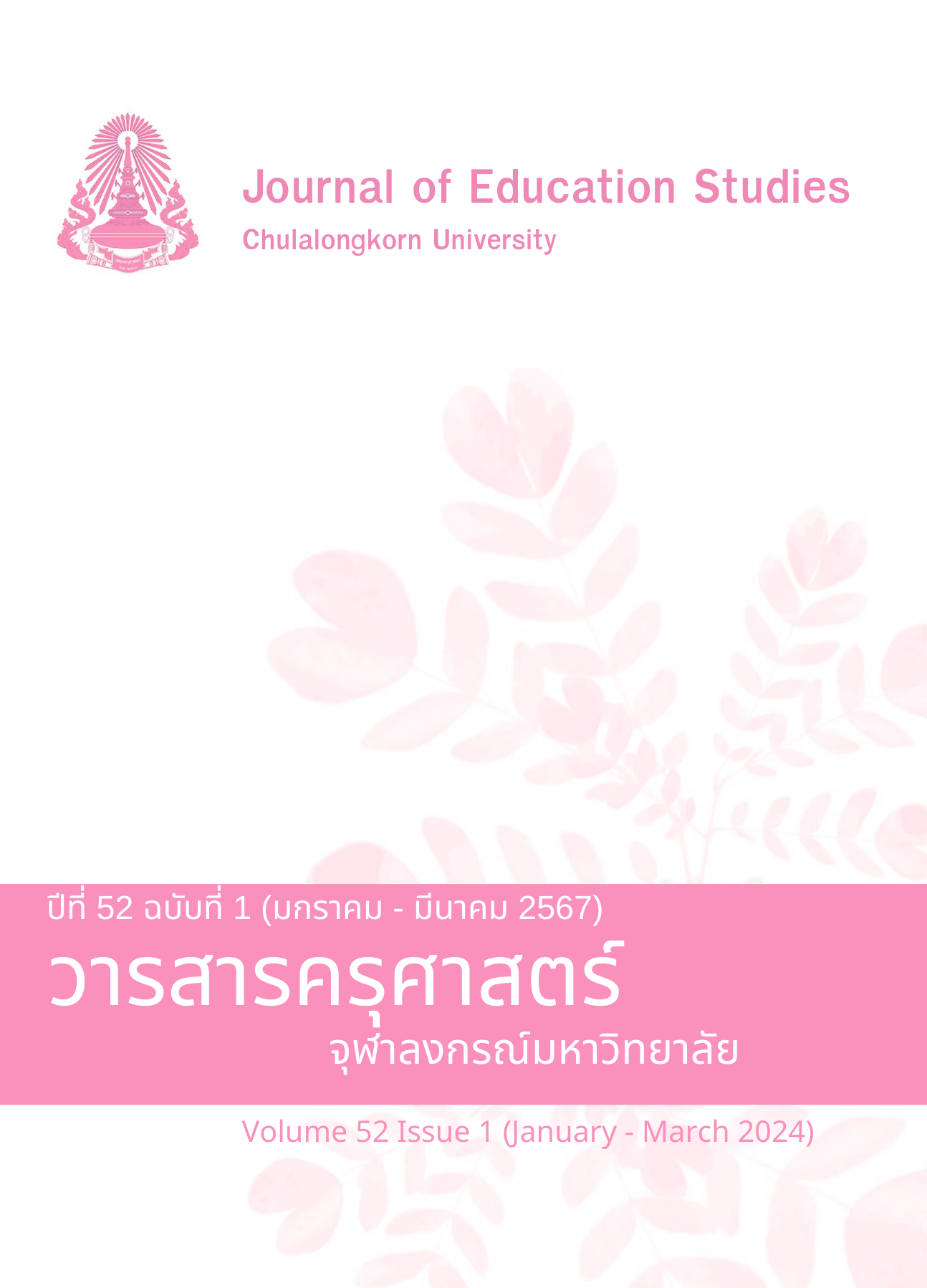The Development of a Mobile Game Application to Promote the Persistence of HSK Level 2 Vocabulary for Grade 11 Students
DOI:
https://doi.org/10.14456/educu.2024.10Keywords:
Games application, Retention, Chinese languageAbstract
The purposes of this research were to 1) develop and determine the quality of a mobile game application 2) compare the learning achievements before and after learning using the game 3) study the memory retention of Chinese words from using the game and 4) study the satisfaction of the students towards the mobile game application. The sample group consisted of 25 students. Achievement was measured via a vocabulary retention test, a satisfaction questionnaire. The statistics used for analysis were mean, standard deviation, t-test, dependent samples, One-Way ANOVA, percentages.
The results of this research were as follows: 1) The content quality of the game applications was found to be at a very good level (M= 4.60, SD= 0.61), the technical aspect was also determined to be at a good level (M= 4.27, SD= 0.45) at the .05 level of statistical significance. In terms of persistence in memorizing words, it was found that both after learning and after learning for 7 days, students’ scores were not significantly different. However, when analyzing students’ retention in memorizing words, it was found that the students' scores were significantly different when testing after 7 days of study and after 30 days of study. The average vocabulary memorization of students after 7 days of study decreased by no more than 10% equal to 9.88 and the average after 30 days decreased by no more than 30% equal to 12.32 Student satisfaction with the game application was also at a high level (M= 4.38, SD= 0.08)
References
ภาษาไทย
กมลรัตน์ หล้าสุวงษ์. (2541). การศึกษาบุคคลเป็นรายกรณี. กรุงเทพฯ : บัณฑิตวิทยาลัย มหาวิทยาลัยศรี
นครินทรวิโรฒประสานมิตร.
ชัยพร วิชชาวุธ. (2540). ความจำมนุษย์. กรุงเทพฯ : ชวนพิมพ์.
บุญศิญา เรืองสมบูรณ์. (2552). ผลของการนำเสนอภาพและข้อความช่วยจำโดยใช้คอมพิวเตอร์ที่มีต่อการระลึกความหมายและลักษณะตัวอักษรคันจิในภาษาญี่ปุ่นของนักเรียนระดับมัธยมศึกษาปีที่ 4. วิทยานิพนธ์ปริญญาครุศาสตรมหาบัณฑิต (สาขาวิชาโสตทัศนศึกษา) คณะครุศาสตร์ จุฬาลงกรณ์มหาวิทยาลัย
พัชรี ปุ่มสันเทียะ สิริณดา เจริญชอบ พัชราวลัย มีทรัพย์ และปิยมนัส วรวิทย์รัตนกุล. (2563).
การพัฒนาสื่อการเรียนการสอนด้วยเทคโนโลยีความเป็นจริงเสริมในรายวิชา ภาษาจีน สำหรับนักเรียนชั้นมัธยมศึกษาปีที่ 4. วารสารครุศาสตร์ จุฬาลงกรณ์มหาวิทยาลัย 48(2) : 184-202.
พิมพร วัฒนากมลกุล และมโนรัตน์ สมคะเนย์. (2564). การพัฒนาทักษะการเรียนรู้คําศัพท์ภาษาจีนโดยการใช้เกมผ่านแอปพลิเคชัน วารสารวิจัยและพัฒนามหาวิทยาลัยราชภัฏสวนสุนันทา 13(1) : 98-109
รัฐพร ศิริพันธุ์. (2561). แนวทางการเตรียมความพร้อมและวิธีการเรียนสำหรับผู้เริ่มเรียนภาษาจีน.
วารสารมหาวิทยาลัยนราธิวาสราชนครินทร์. 5(1): 103-112.
วันวิสา ดาดี. (2553). ทฤษฎี Game Based Learning. http://nuybeam.blogspot.com/2010/08/game-based-learning.html
ศศิณัฎฐ์ สรรคบุรานุรักษ์. (2560). สื่อมัลติมีเดียและเทคโนโลยีกับการสอนภาษาจีนในศตวรรษที่ 21. วารสารวิชาการ มหาวิทยาลัยศิลปากร. 10(3): 1239-1245.
ศิริวรรณ ฉัตรมณีรุ่งเจริญ และวรางคณา ทองนพคุณ. (2556). ทักษะแห่งศตวรรษที่ 21 ความท้าทายในอนาคต 21st Century Skills : The Challenges Ahead. คณะครุศาสตร์ มหาวิทยาลัยราชภัฏภูเก็ต. ภูเก็ต
ศูนย์จีนศึกษา. (2551). ความร่วมมือไทย-จีน ด้านการเรียนการสอนภาษาจีนในประเทศไทย. กรุงเทพมหานคร: ศูนย์จีนศึกษา สถาบันเอเชียศึกษา จุฬาลงกรณ์มหาวิทยาลัย.
สุภาณี ศรีอุทธา และ สวียา สุรมณี. (2558). การพัฒนาเกมแอปพลิเคชันเพื่อการเรียนรู้บนแท็บเล็ต เรื่อง ฮาร์ดแวร์คอมพิวเตอร์ สำหรับชั้นมัธยมศึกษาปีที่ 4. วิทยาศาสตรบัณฑิต มหาวิทยาลัยราชภัฏกาฬสินธุ์.
อภิเชษฐ์ ขาวเผือก. (2558). การพัฒนาเกมการศึกษาบนแท็บเล็ตโดยใช้เทคนิคช่วยจำเพื่อส่งเสริมความคงทนในการจำคำศัพท์ภาษาอังกฤษ สำหรับนักเรียนชั้นประถมศึกษาปี ที่ 2 โรงเรียนวัดสะแกงาม.
การค้นคว้าอิสระปริญญาศึกษาศาสตรมหาบัณฑิต (สาขาวิชาเทคโนโลยีการศึกษา) บัณฑิตวิทยาลัย มหาวิทยาลัยศิลปากร.
ภาษาต่างประเทศ
Ebbinghaus, H. (1913). Memory: A contribution to experimental psychology. (H. A. Ruger & C. E. Bussenius, Trans.). Teachers College Press. https://doi.org/10.1037/10011-000
Downloads
Published
How to Cite
Issue
Section
License

This work is licensed under a Creative Commons Attribution-NonCommercial-NoDerivatives 4.0 International License.




